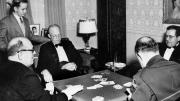President Dwight Eisenhower remains a vague figure (genial, a golfer) in public memory, a cipher between the feisty Harry Truman and the glamorous John F. Kennedy. Focusing on the ultimate issue—the threat of nuclear war—Evan Thomas ’73 finds in Ike tactical brilliance and, where needed, ruthless efficacy. From the introduction to his new book, Ike’s Bluff: President Eisenhower’s Secret Battle to Save the World (Little, Brown, $29.99):
Eisenhower was an expert at bridge, an activity now associated in the American mind with middle-aged or elderly people sitting around a table staring at cards. For Eisenhower, who played as much as possible, the game was a relaxing way of doing what he did all day: reading minds, weighing options (his own and others), thinking ahead, and concealing his intentions. Eisenhower, who generally radiated warm sincerity and whose emotions were easy to read, was actually a great bluffer, and not just at cards.
Eisenhower’s basic policy throughout his presidency was known as Massive Retaliation. It was, in essence, a threat to use nuclear weapons against Communist aggression wherever and whenever it might occur. Even in his most private councils, Eisenhower remained vague about what he might or might not do in crisis. His closest adviser, General Andrew Goodpaster, guessed Ike would never use nuclear weapons, but others weren’t so sure, and Eisenhower wasn’t about to tell them.
Indeed, Eisenhower sometimes sounded as if he regarded nuclear weapons as conventional weapons—“like bullets,” he once said. Other times he seemed determined to rid the world of their scourge.…Eisenhower’s mission, which he achieved after he extricated America from the Korean War in 1953, was to avoid any war. As a general, Eisenhower had commanded a conquering army in a world war ended only by the use of two atomic bombs. Though he posed as a poor farm boy, he was a scholar who had closely read Clausewitz’s treatise On War, and took to heart its basic, if overlooked, message: that small wars can become big wars, and that a nation fighting for survival will stop at nothing. Eisenhower managed, by cleverness, indirection, subtlety, and downright deviousness—and by embracing the very weapon he could never use—to safeguard his country and possibly the rest of mankind from annihilation. As the United States and the Soviet Union created the power to end the world in the 1950s, the genial old soldier with a weakened heart contrived to keep the peace. He did so in his own distinctive way. He was honorable but occasionally opaque, outwardly amiable but inwardly seething.









